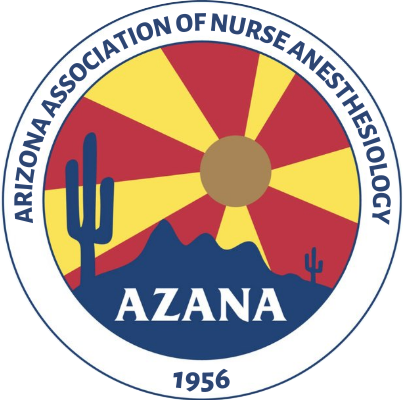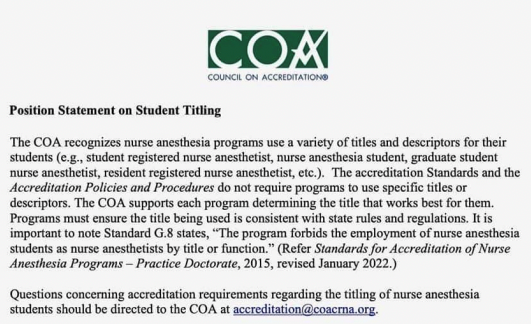Introduction:
In recent years, it has become increasingly important that patients and other members of the public be fully informed as to who is administering the anesthetic and caring for patients while undergoing surgery. The AZANA desires patients and the public to be fully informed as to who takes responsibility for patients being administered anesthesia while undergoing surgery and for patients and the public to know that CRNAs provide expert-level anesthesiology services, are members of the nursing profession, and are distinct from their physician and dentist colleagues.
Anesthesiology has been the joint specialty of nursing, medicine, and dentistry, for over 100 years. CRNAs in Arizona and throughout the country have practiced independently during that time and offer expert-level anesthesia services to patients throughout the state, especially those in rural and underserved communities.
In recent years, to improve public understanding of these different professionals and expertise, updated terms such as “nurse anesthesiologist,” “physician anesthesiologist” and “dentist anesthesiologist” have become recognized by the accordant national professional and legal bodies.
Position:
AZANA endorses the following descriptors and titles to identify nurse anesthetists: “Certified Registered Nurse Anesthetist,” “Certified Registered Nurse Anesthesiologist,” “CRNA,” “nurse anesthetist,” and “nurse anesthesiologist.”
Arizona statute remains silent (i.e. does not specifically prohibit or authorize) on terms such as “nurse anesthesiologist,” “physician anesthesiologist” and “dentist anesthesiologist.” As such, these terms of “descriptions” meant to enhance understanding for stakeholders, similar to terms such as “ER doctor” and “ER nurse,” which are also in common parlance but not specifically prohibited or authorized by the state of Arizona.
Key Facts and Timeline:
CRNAs begin their professional history of anesthesiology services in the civil war and in 1931, the American Association of Nurse Anesthetists is founded with a mission of advancing “the art and science of anesthesiology.”
Physician Anesthetists change their society from the “American Society of Anesthetists” to the “American Society of Anesthesiologists” in 1945.
These above historical facts demonstrate the precedent and history of antecedents (physician, nurse, dentist, etc) being used before a specialty (anesthesiology).
In recent years several key developments have supported updated and accurate terminology for anesthesiology professionals and assistants:
The American Society of Anesthesiologists’ (ASA) research and highly notable adoption of the term “physician anesthesiologist” for their members since 2013.
2013 American Society of Anesthesiologists’ research that 6/10 Americans did not associate the term “anesthesiologist” with “physician”, leading to their promotion of the term “physician anesthesiologist.”
The American Dentist Association’s (ADA) recognition of anesthesiology as a dental specialty and recognition of the “dentist anesthesiologist” in 2019
The recognition of “veterinary anesthesiologists” by American College of Veterinary Anesthesia and Analgesia (ACVAA).
The broad promotion and adoption of the term “anesthetist” by anesthesiology assistants.
The international update from “anaesthestist” to “anaesthesiologist” by other major Western Societies for professionals who are recognized experts in anesthesiology.
The recognition of the term “nurse anesthesiologist” by the American Association of Nurse Anesthetists (AANA) since 2018.
The August 2021 update of the AANA’s name to the “American Association of Nurse Anesthesiology.”
Legal Developments:
1. The recent legal precedent that “anesthesiologist” is a professional-neutral, legal term of art, unable to be patented by one profession, and its use by other professions is useful and non-misleading commercial free speech in advertising to the public which is constitutionally protected.
2. Five (5) state Boards of Nursing (Arizona, Idaho, Alaska, Florida, and New Hampshire) have already recognized the nurse anesthesiologist.
Public Research Data:
Lastly, preliminary data has demonstrated the utility of “nurse anesthesiologist, ”demonstrating that the public clearly understandings the difference between “physician anesthesiologist” and “nurse anesthesiologist” and that “nurse anesthesiologist” is readily understood by the public to be a professional who is a member of the nursing profession and an expert in anesthesia services.
Conclusion:
Using “Nurse Anesthesiologist” is an evidence-based communication tool that accurately describes CRNAs as members of the nursing profession as well as experts in anesthesiology services. It is consistent with the pattern(antecedent, specialty) established the by the two other major professions involved in anesthesiology as well as other nomenclature updates in anesthesiology.
As such, we endorse this term for our members to use with the public to avoid any potential confusion with other professionals so that the public is fully informed.




